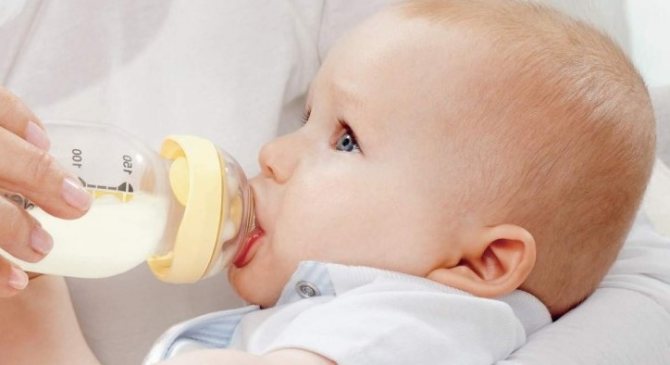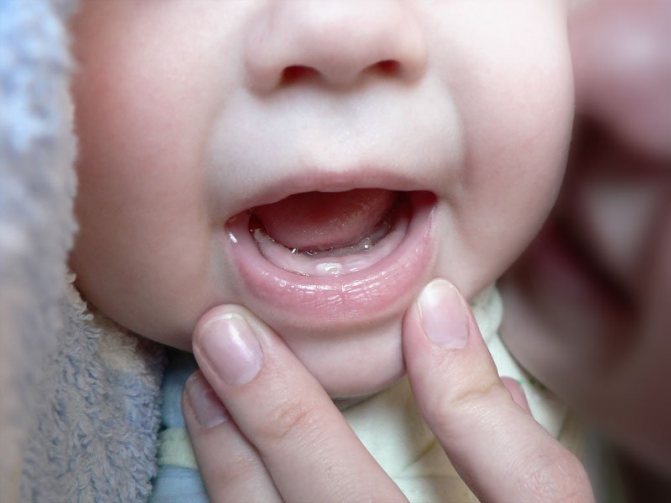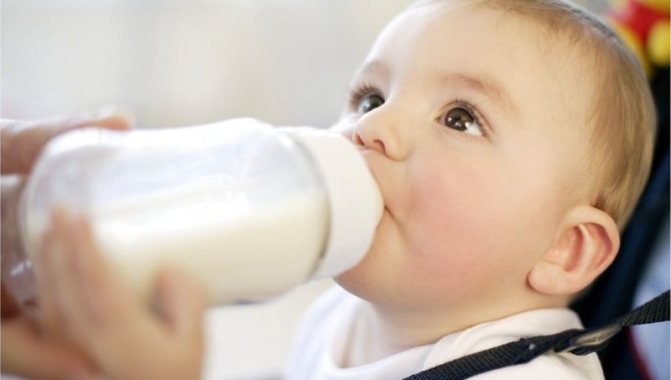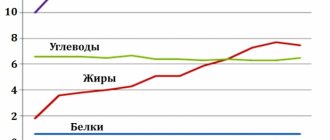Weight gain
The situation is different with newborns.
Children are born with the instinct to suck; their little bodies have not yet learned to overeat, so the baby absorbs as much as is required, no more. If parents think that the newborn is not eating enough, check whether the baby is gaining weight. In pediatrics, special standards have been approved that stipulate how many grams a baby gains in weight every month, every week, every year. By checking the standards, parents will understand whether the child is eating properly, whether he has enough milk, or whether it is time to introduce complementary foods. The tables show weight gain over the course of a month for boys and girls, who grow and develop differently.
The increase per week is almost not noticeable, only 70-190 g, but a month-old baby already grows by 760-1340 g. In 2 months, the baby adds 1720-2640 g. Then the rate of weight gain slows down a little and in 3 months it is 2420-3540 g. A by 4 months the baby gains only 2980-4270, although he eats well, and much more than in the first days. Therefore, it seems to us that the child does not have enough nutrition.
The weight gain norms are calculated for the average child; you should not follow them to the nearest gram. Each person is individual in external parameters, and internal processes are also different. If an infant is in good health, alert and active, and weight gain is observed, then parents have no reason to worry.
Improper nutrition
Starting from the sixth month after birth and up to one year, the baby is gradually introduced to complementary foods. Mother's milk is the most delicious and healthy food in the world, but over time the baby grows up to other foods. By this time, the gastrointestinal tract has formed into an almost adult one, ready to digest coarser foods. Therefore, only on mother's milk the baby is hungry. From this time on, the baby is fed additionally.
Frequent reasons for the “little food” of children are their overfeeding by their mothers and grandmothers, as well as the fact that they simply do not have time to get hungry properly
This is where the problems begin. Here are some of them:
- Many mothers spend a long time looking for “their” formula that would suit the baby, that would not cause allergies, and that he would like. But before making a choice, most people have to try at least several brands.
- Long-term breastfeeding. Often it leads to the fact that at 8-9 months the baby does not accept complementary foods at all and does not eat anything except breast milk.
- The baby refuses to eat food that seems to be familiar to him - formula or complementary foods that his mother has already tried with him. She wonders why she doesn’t eat and what to do about it. For a month he ate well, opened his mouth, but now he refuses. The reasons are banal: either the portion is too large (the mother overfeeds the baby), or the little one simply did not have time to get hungry. With age, children's routine changes, but parents do not always have time to fix this: they feed and put their children to bed according to their usual rhythm, while the baby has already “outgrown” it. So, you should reduce the portions, do not feed when you don’t want to, otherwise your baby won’t get used to the new food even within a year.

Then other problems begin. Don't think that you will celebrate your 1 year anniversary and all your problems will be a thing of the past. Now you offer the adult little one another food ─ solids. If he ate from a bottle for 3-4 months, now he begins to eat purees and porridge with a spoon. If your baby hasn't learned to eat solid food by the age of one, help him.
Perhaps the baby has become worse at eating the formula because he receives it too often or in excessive quantities. Breast milk is absorbed much faster than milk substitutes. Natural feeding can occur on demand, and artificial feeding only on a schedule.

Formula feeding must be done in accordance with the child’s age and strictly according to the schedule.
At first, the baby’s gastrointestinal tract copes with the excess amount of food, but then problems arise:
- decreased appetite - the child eats the formula poorly or refuses it altogether;
- bloating - undigested residues lead to fermentation;
- colic – gases stretch the intestinal walls, causing pain;
- problems with bowel movements - constipation or diarrhea.
At 5-6 months, as well as at an older age, the offspring may eat less formula due to the consumption of other products - tea, juices, compotes, cookies, fruit puree and other things. Sugary drinks and untimely snacks reduce appetite and should be limited. In addition, after the introduction of complementary foods, some babies refuse their usual product in favor of “adult” food.
Why does a newborn baby not eat at all or eat little?
Newborns are not only a sea of emotions, joy and happiness, they are also a lot of new and unknown things that will worry young parents every minute.
First of all, the mother always worries that her baby is warm, well-fed and sleeps soundly. Mothers have already been able to go through the difficult stage of childbirth and now the most important thing for them is the period of breastfeeding.
1. In most cases, this happens due to stress. The child has not yet adapted to the new conditions, so he does not want to eat what is given to him. In this situation, you cannot shout at the baby and force him to eat. You need to be patient and wait. Over time, the child will get used to it and will be happy to eat with his peers.
2. Often, food in a child care facility differs significantly from food at home.
Mothers have already been able to go through the difficult stage of childbirth and now the most important thing for them is the period of breastfeeding. During this period, a mother may be concerned about why her newborn baby is not eating. He may completely refuse breast milk, sleep constantly, or latch onto the breast for just a few minutes. Let's look at why the child behaves this way and whether it is worth worrying about it.
Basically, babies, and in particular infants, can refuse healthy mother's milk for various reasons. Pediatricians evaluate them according to three main possible groups of problems:
- Problems with the newborn itself. In the first days after birth, the baby may be in a state of adaptation to the new world. He may be weak, drowsy and inactive. It is during such periods that the baby does not feel like eating at all, or a few sucks every 2-3 hours are enough for him. In such cases, there is no need to panic too much. Of course, it may seem to you that the newborn eats little, but this is quite enough for him. A more serious situation arises if the child refuses to eat even after 5-7 days. In this situation, there may be several reasons or they are complexly interconnected. First of all, this may be a physiological feature of the child, namely a short frenulum of the child’s tongue or a poor sucking reflex, which will develop gradually. Often the reason why a newborn does not eat is a simple bottle with which caring mothers try to feed the child. Even despite their young age, children are quite smart. They prefer to eat only from simpler artificial devices, where they do not have to put in a lot of effort - milk or other food will pour into their mouth.
- Physiological state of the woman in labor. Another reason why a newborn does not eat well is the physiological state of the woman, namely the medications that were administered to the mother during childbirth. Quite often, during complex and painful labor processes, women are given painkillers that instantly penetrate the mother’s blood, and therefore the child’s body. Because of this, he may be lethargic, drowsy, inactive and eat very little for several days after birth.
- Features of the breast and mammary glands. The baby may be hungry due to the physiological characteristics of the mother's breast. In particular, if she has rather inverted and flat nipples, with which it is not so easy to get milk.
If the baby is not eating well, do not immediately sound the alarm and panic. Perhaps the baby does not eat during this period because he has not yet had time to experience this world. Most likely, the baby needs to be left near his mother for a while so that he can get used to it and find a power source on his own. Read more about breastfeeding newborns →
You should also seek advice from a lactation specialist or pediatrician. In the future, it is worth feeding the child by the hour, as required by doctors. This needs to be done every 3 hours. However, it is best to give your baby breastfeeding on demand. This will protect him from possible weight loss in the first months of life.
If a child eats poorly even at 4 months, then most likely this is the specificity of the child’s metabolism and unspent energy. A possible reason may be a gradual decrease in mother's milk; if the baby loses weight while breastfeeding, you should immediately consult a doctor. Read more about how much a baby should weigh →
If your baby is older, then the solution to the problem may lie elsewhere. Most likely, a child at 5 months is not eating well due to insufficient milk supply, teeth growth, or a desire to try something new. In such a situation, you just need to introduce complementary foods, which will ease mother’s sleepless nights, allow the baby to have a wonderful appetite and accelerate the rapid development of the whole organism. Read more about complementary feeding for breastfed children →
You should worry in cases where a child with poor appetite begins to lose weight. Especially if a stable and constant reset is visible. A baby should steadily gain from 300 to 800 grams per month. If this does not happen, you should immediately consult a doctor who will determine the cause of poor appetite and help parents cope with this problem. Feeding on a schedule, eliminating certain problems with the health or physiology of the child will give good results in a matter of weeks.
Be smart and vigilant with your children!
The birth of a child is a long-awaited event for every family. But the happiness of motherhood can be overshadowed by various problems that accompany the baby in the first year of his life. The basic needs of a newborn are food and sleep. Many parents are faced with the problem of poor children's sleep. Some children, on the contrary, sleep often and for a long time.
Every mother wants to know if her baby is hungry, if he is getting enough, and if he has enough milk. To do this, you need to know the norms of food consumption for newborns.
In the first days of his life, a breastfed baby can eat very often - about 10 times a day. In this case, one feeding can take 10-40 minutes.
A newborn has a very small stomach (approximately 7 ml in volume), so 1 teaspoon is enough for him at the first feeding. The colostrum that a baby eats on the first day is very fatty and nutritious; it is released in small quantities, sufficient for the baby. During the first day, the child eats about 100 ml.
A baby 3-4 days old eats 20-40 g at one feeding. A child born a week ago eats 50-70 g of milk at a time, and a two-week-old baby eats 60-80 g. A month-old baby should eat 90-110 g of milk, and two months - 110-140 g. These figures are average. They should not be taken as a rule, but can be used as a guide.
The amount of milk consumed depends on many factors: the baby’s weight, his state of health, time of day, individual nutritional needs and the degree of fat content of the milk.
Pediatricians assure that with proper breastfeeding, the baby cannot eat too much or too little, since milk is produced exactly as much as he needs.
We suggest you familiarize yourself with: Documents for accepting an inheritance for an apartment after the death of a spouse
To calculate how much formula a formula baby should eat at a time, you can use one of two formulas. In accordance with the first formula, you need to multiply the baby’s age in days by 10. To find out the baby’s daily food intake, you need to multiply the number of days he has lived by 70 (if he weighs more than 3 kg 200 g) or by 80 (if he weighs less than 3.2 kg).

Using another formula, you can divide the baby’s weight by his height in cm. The resulting number will be the approximate amount of food eaten at a time.
One of the easiest ways to check how well a baby is eating is to count the diapers described per day. If there are 12 or more, then there is nothing to worry about.
A baby who is not even a month old from birth should eat every 1.5-2 hours. He has a very small stomach that cannot accommodate much food. Rare breastfeeding leads to problems with lactation, the occurrence of mastopathy in the mother, the child’s lack of vital vitamins and microelements, and dehydration of his body.
Most modern pediatricians recommend feeding children not by the hour, but on demand. Moreover, the “first demand” does not have to mean screaming or crying. A sleepy baby may signal his desire to eat in some other way, but the mother may not understand this signal and think that the baby does not need anything since he does not scream.
So you shouldn’t wait for your baby to cry hungry; it’s better to offer him food when he’s sleeping. You don't have to wake him up for this. You can just pick him up and poke his nose into his chest. The baby will hear the smell of milk, open his mouth, find the breast and feed, and then continue to sleep.
If your baby refuses complementary foods
Sometimes it happens that a newborn does not eat well. This doesn’t happen often, but in some families it happens that the child really sucks weakly or refuses the breast altogether. When a baby doesn’t eat well or doesn’t breastfeed, it’s scary for the baby, for the mother, and for all family members. A hungry baby wants to eat, screams from hunger, quickly loses weight and becomes weak.

The baby may not eat much, but if he behaves actively, is not capricious, does not cry, then most likely everything is fine with him
Sometimes a child is born weak, especially a premature one. This baby sleeps a lot and eats almost nothing. In this case, pediatricians advise switching to a free feeding method, that is, feeding when you wake up. Do not wake up a sleeping baby: in sleep, the baby gains strength. Gradually the baby will get stronger and nutrition will improve.
Feed your small baby not by the hour, but on demand. Let him eat little by little, as much as he can eat, then he will learn to eat more. To help your baby, express your milk. Supplement with expressed milk using a spoon or other means.
If there are no congenital pathologies or ailments, the baby eats as much as the body requires. If the child does not have enough food, he does not feel well, the issue is resolved with the attending physician. The pediatrician will examine, collect anamnesis, and prescribe treatment. According to indications, it is recommended to undergo tests and consult medical specialists.
Pediatricians recommend introducing complementary foods to infants no earlier than six months of age, when their enzyme and digestive systems are ready for new food. But sometimes mothers face a problem when their infant does not eat complementary foods. All the parents’ efforts are in vain: the baby spits out any food.
There are many reasons why a baby refuses complementary feeding:
- The taste of mother's milk or formula is familiar to him, but he has not tried new food.
- The mother could frighten the baby by forcing him to eat unfamiliar food. An infant does not want to eat complementary foods because he associates new food with unpleasant emotions.
- The first dose of new food was tasteless (for example, sour), and therefore all complementary foods for the baby are associated with something unpleasant.
- The baby may refuse complementary foods in hot weather.
- The mother, following all the pediatricians’ recommendations, did not take into account the baby’s unpreparedness for complementary feeding.
If such a situation arises, first of all, the mother should not force the child. You need to make sure that your baby is ready for dietary changes. If the baby is interested in adult food, then you can safely introduce complementary foods.
In addition, if an infant does not eat complementary foods, you need to make sure that by the time of feeding he is hungry, but not excessively, otherwise he will definitely choose mother’s milk.
It happens that the baby does not like vegetable complementary foods. In this case, you can mix vegetables with food that the little one likes.
If the child does not like the new dish, there is no need to insist, but it is better to put off the porridge or puree for one or two weeks, and then let him try again.
So, we found out how much an infant should eat, and looked at the main reasons why a baby sometimes refuses milk or food. If the child is active, then most likely the appetite has disappeared temporarily. But if the baby’s condition causes concern, you should immediately consult a doctor. It is very important that parents understand their child. It's not difficult at all if you watch it carefully.
Possible reasons
The baby is the same person as his parents, with his own desires and preferences, which change every month. He may not indicate his needs at all, he may scream and scream, as happens with hunger or, conversely, lack of appetite. What to do if the child does not eat anything, young mothers cannot always answer immediately.
In the first year, the baby develops rapidly:
- he gets acquainted with the new world,
- sometimes encounters colic, gas, ailments,
- he's getting teeth
- he begins to try other foods other than mother's milk and formula,
- he gains new knowledge, learns skills and hones them.
Every discovery and sensation is a whole Universe for him. That is why loss of appetite is a global issue and requires calm, patience and the ability to react correctly and in a timely manner.
What to do if the baby does not eat is sometimes difficult to answer even for an experienced mother. For some babies, all attempts to feed them end in hysterics.
If a child does not eat well, there is always a specific reason for this. Initially it costs:
- give yourself time to assess the situation,
- identify the disease, if any,
- analyze the quality of complementary foods and its type when it has already been introduced,
- perhaps the baby simply does not like this or that complementary food product (for example, meat without additives often causes rejection in the child; in the form of some kind of casserole or dish, it is devoured by both cheeks),
- study how the child spends his day.
The main possible causes of poor appetite in infants:
- Teething,
- Tummy pain, colic,
- Problems with milk, features of the feeding process,
- Meteosensitivity,
- Any diseases
- External stimuli.
Note! It happens that the child does not want to eat at first and is not even able to grab the breast. You need to understand that this is not a loss of appetite, but a bad mood, fatigue or some emotional experiences of the baby. Perhaps he called for help, but the parent did not immediately respond. In this case, it is necessary to calm the child, stroke and say kind words, try to give a pacifier, and after a few minutes offer the breast or a bottle with formula.

Teething in babies
The baby eats poorly or does not want to eat at all due to teething. This moment for many babies occurs at 5-6 months, sometimes later. This is a new sensation for them, and they simply may not know what it is or how to react. Parents should be patient, because this process is natural and temporary.
Due to the fact that the baby's gums swell, this brings him discomfort, sometimes causing severe pain. Not only does appetite decrease, but there are also frequent cases of fever.
Additional Information. When teething, the temperature does not rise above 38 degrees. It is recommended to knock down the mark of 38.5, which, as a rule, appears during a viral or infectious disease. All values up to this figure are considered safe for health and are a manifestation of the body’s fight against a virus or infection.
If the baby is very capricious and worried, it is necessary to give him an anesthetic. Also, to relieve symptoms, you can purchase special gels with a cooling and soothing effect and teethers for gum massage in pharmacies. The gel is used several times a day.

Baby cries with colic
If a child does not eat anything during the first two months, constantly abandons the breast, and reacts to a bottle with formula by crying, then intestinal colic may occur. As a rule, they are periodic during the day (most often in the evening), the baby screams loudly at the moment of colic and presses his legs to his tummy.
Note! The presence of this diagnosis can only be confirmed by specialists, since, in addition to colic, dysbiosis is often found in babies. Its signs are an unpleasant smell of feces, green color and the presence of mucus in the stool. If the mother uses any antibacterial drugs, then the risk of dysbacteriosis in the baby is very high.
Pediatricians recommend treating colic with special drops or suspensions, which are prescribed at the appointment. Applying a warm diaper at the time of an attack and massaging the navel area counterclockwise also help.
The digestive system of a child at birth is imperfect. Within 2-4 months everything gets better, and colic, as a rule, no longer bothers you.

Baby refuses breast milk
Even in the maternity hospital, the mother may notice that the baby, who was barely put to the breast, after a minute already lets go and turns away. Why the child in such cases does not eat anything or sucks very little, breastfeeding experts identify three reasons:
- Incorrect attachment to the breast
- Problems with milk
- A lot of milk.
In the first situation, do not be afraid to ask for help. Not all maternity hospitals monitor correct breastfeeding and do not teach it. However, failure can cost the mother lactostasis, mastitis and switching to formula. When preparing for childbirth, the most correct decision would be to attend specialized training courses, where lecturers will tell and show with examples all the mistakes and shortcomings when feeding babies. If you weren’t able to visit them and there was a problem with the application, the following recommendations will help:
- A comfortable position for mother and baby is required,
- The newborn's nose touches or is close to the chest,
- The baby takes the nipple himself; you should not pull the nipple towards him. You can massage the baby’s cheek when he opens his mouth wide, pull him to your chest,
- When feeding, it grabs both the nipple and the areola, the lips are turned outward,
- There are no extraneous sounds during the process, except sips,
- Mom feels comfortable.
Milk problems are most often caused by insufficient milk supply from the mother. Most likely, there are problems with lactation. In the practice of breastfeeding, cases of lactation crises are known. However, such phenomena quickly disappear: a day or two - and everything goes as usual again.
What to do:
If, nevertheless, the milk disappears, or there is less milk, then supplementary feeding with formula is recommended. Remember that you should first offer the baby the breast, and only then supplement it.
When there is a lot of milk, the baby begins to choke from too powerful a stream. In some cases, the child turns away immediately and does not eat anything; after a while, he may completely refuse the breast. This phenomenon happens in the very first weeks of a baby’s life.
Important! When the taste of mother's milk changes, the baby also eats little and refuses to attach to the breast. In the first three months, he may react this way to taste changes due to new food eaten by his mother. Therefore, you should carefully monitor the baby’s reaction to this or that food in your menu.
Babies are very sensitive to changes in the weather. Fluctuations in atmospheric pressure cause headaches, an uneven emotional state and loss of appetite.
If you wait a while, all the symptoms will disappear, and the baby will eat with appetite again. However, if the diagnosis is alarming or delayed, you need to make an appointment with a pediatrician and neurologist. It is likely that high intracranial pressure may be present and certain medications are needed for treatment.
Often the consequence of poor appetite can be diseases:
- Cold. If snot appears, it is difficult for the baby to suck the breast or bottle. He starts to get nervous, tries to eat, but quickly gives up and screams. In such cases, it is necessary to clean the nasal passages. Nozzle ejectors will help with this, as well as rinsing the nose with saline solution. You can also contact your pediatrician, who will prescribe medications to combat nasal congestion.

Colds in infants
- Otitis. When swallowing, the pain in the ears increases greatly. Therefore, with such an illness, the baby refuses to eat. The best solution would be to try giving him expressed milk from a spoon in small quantities. To understand that a child has otitis media, you need to press the protruding part of the ear towards the cheek. If the baby begins to twitch and scream, then you urgently need to call a doctor or an ambulance.
- Thrush or stomatitis. If white spots are found in the baby’s mouth, as well as bright red mucous membranes, and the baby is worried when feeding and refuses to eat, then this may be an oral disease. You shouldn’t leave everything to chance, as this only increases the baby’s pain. First of all, call a doctor. To alleviate the condition, you need to wipe the baby’s mouth after finishing feeding with a cotton swab with a solution of baking soda (take 1 teaspoon of soda per glass of water). In addition, treat the mother’s breasts with the same solution.
Until 6 months, the baby reacts little to external stimuli; he is only interested in feeding and sleeping. When he learned to sit and pick up objects, everything becomes interesting to him. A world full of wonders opens up for him.
While eating, he can be distracted by absolutely everything, be it a bright light, loud music, a new toy, or a person walking in. At such moments, it is very difficult to switch the attention of a curious baby. Therefore, it is necessary in advance, before feeding, to create a calm environment for yourself and the baby.
Improper nutrition
If a child refuses to eat formula, he may simply not like the taste. Various hypoallergenic and low-lactose products that are prescribed to children for health reasons have a bitter taste. This problem is especially acute for mothers of mixed-fed babies, because after tasting milk with a pleasant aroma, children do not want to drink a liquid with unique characteristics.

If the child refuses the formula, contact your pediatrician, he will help you choose another food for the child
A negative reaction to a milk substitute may not occur immediately, but after some time. Initially, the baby agrees to the product, and then he gets tired of its taste. The only way out of the situation is to try different brands. For example, some children enjoy drinking fermented milk mixtures. However, before experimenting, it is better to consult a doctor.
Another factor that leads to the fact that a child does not want to eat is that he is not satisfied with the temperature of the food. The optimal range is 35-40°. A hotter or colder product is perceived poorly.
In addition, the composition of the chosen diet may simply not be suitable for a formula-fed or natural-fed baby. As a result, he will develop allergies. Its symptoms:
- redness on the skin;
- itching;
- irritability;
- sleep problems;
- stool disorders;
- colic.
Reasons why a baby may feed infrequently
Restless sleep, weak appetite and little weight gain are common causes of complaints among parents of infants. A hungry baby is whiny and anxious, he often wakes up, but applying to the breast does not change the situation (he either does not suck at all, or does not eat enough). A consultation with a pediatrician will help you find the cause and correct the situation. Common causes of poor appetite in newborns are:
- Incorrect attachment to the breast. It is quite difficult for an inexperienced mother to master this art. Finding a comfortable position may take more than one day, so it is important to read relevant literature 1-3 months before giving birth, or get advice on breastfeeding.
- Pathology of newborns. It is identified by a neonatologist in the maternity hospital. For example, a short frenulum of the tongue may prevent a baby from sucking (more details in the article: a child has a short frenulum - what to do in this case?).
- During childbirth, the mother was prescribed painkillers. Many of them are eliminated from the body for a long time, penetrate into milk and affect the baby’s ability to suckle.
- Unformed nasal mucosa. The baby cannot suckle at the breast and breathe through his mouth at the same time, and it can be difficult for him to breathe through his nose. Nasal drops and maintaining optimal temperature (18-22 ºС) and humidity in the room (60-70%) will help improve nasal breathing.
We suggest you read: What actions need to be taken after purchasing an apartment
Weak and premature babies mostly sleep and eat almost nothing. Neonatologists advise mothers to switch to a free feeding mode, which involves latching not by the clock, but on demand. Don't wake up your baby to feed. In his sleep he gains strength, but when he wakes up, he needs to be put to his chest. Let the baby eat little by little as much as he wants. At 1-3 months, you can also supplement with expressed milk from a spoon.

After waking up, the baby needs to be fed
Poor sleep affects the baby's activity. This leaves him in a half-asleep state, which affects his perception of the world around him. The following signs indicate that a newborn baby is not sleeping enough:
- regular awakenings at intervals of 5-10 minutes;
- staying awake for more than 4 hours in a row;
- daily amount of sleep is less than 15 hours (age - up to 2 months);
- anxiety, overexcitement, difficulty going to bed.

The most common reason that a baby does not eat well is improper attachment to the breast. Today, not all maternity hospitals help establish breastfeeding.
There can be several problems with milk:
- Lack of milk. When a baby is put to the breast incorrectly, milk is produced in insufficient quantities for him. A lactation consultant can help solve this problem. To increase the amount of milk produced by the mammary glands, it is necessary to put the baby to the breast as often as possible, the mother must establish close contact with him. To restore lactation, you should pump more often, drink more fluids, and drink special fennel-based teas. If the baby gains little weight, you will have to switch to mixed feeding. First, the mother offers the baby one breast, then the other, and then supplements with formula.
- Excess milk. When there is too much milk, it flows in a strong stream into the baby’s mouth, he begins to choke, gets scared and refuses to breastfeed. To solve this problem, you need to pump a little before feeding.
- Change in the taste of milk. It can change its taste if mom eats something spicy, salty or sour. The same can happen after taking medications or becoming pregnant.
If there is some kind of pathology, then the child may not be able to suck at all, but such problems are usually identified in the maternity hospital. A short frenulum of the tongue (the membrane that attaches the tongue to the bottom of the mouth) or a cleft palate can prevent milk from being sucked out. It may not be completely split, but only in the depths of the mouth, which may not even be noticed at first. Some babies are born with a weak sucking reflex that develops gradually.

A newborn may have trouble latching on the breast if any medications, such as the painkiller Promedol, were used during childbirth. It enters the mother’s bloodstream, then into the baby’s body and after birth is not removed from it for a long time, affecting the baby’s ability to suck.
When a baby is sick, he sleeps a lot, as the body loses a lot of energy in the fight against the disease and replenishes it. If he has a cold, his stuffy nose prevents him from sucking milk.
The baby will not be able to eat normally when he has colic, dysbiosis or otitis media. But in this case, his sleep will also be disrupted.
Feeding problems occur with thrush (stomatitis). It is painful for the baby to suck, so he may refuse the breast and sleep for a long time due to loss of strength. To diagnose the disease, it is worth looking into the baby’s mouth. There you can find white spots that increase in size over time, and under them there is red mucous membrane.
At home, you can prepare your own medicine for stomatitis. To do this, add a teaspoon of baking soda to a glass of cool boiled water. The resulting solution is used to treat the mother’s breasts and the baby’s oral cavity.
Normally, a newborn knows how much time he needs to sleep and when it is time to feed him. But deviations from the norm happen very often.
If the baby was born premature, his body is in a relaxed state, he constantly sleeps and does not ask for food, since he cannot wake up on his own. In this case, the mother must feed him. The same applies to children who are affected by drugs administered to the mother during childbirth. The mother must wake him up and feed him until he recovers and begins to demand food on his own.
Some babies can be woken up very easily, with others it can be much more difficult. It all depends on the specific situation and the specific child. You can raise and lower your baby's arm. If he reacts to this in some way (eyelids twitch, arm muscles tense, etc.), then he is in the phase of rapid, shallow sleep, and you can safely wake him up. If the hand remains soft and relaxed, it means that he is now in the slow-wave sleep phase and it will not be easy to wake him up.
If the child does not want to wake up, and it is time to feed him, it is worth removing the blanket from him, undressing him, and changing his diaper. The baby can be hugged, stroked on the back, picked up and placed in an upright position. You need to start talking to him, you can show him a bright object, a beautiful rattle, or sing him a song.
The state of the newborn’s body, his sleep and appetite can be influenced by the atmosphere in the apartment. If parents swear, quarrel, insult each other, shout, or loudly sort things out, the baby finds himself in a stressful situation. Try to avoid conflict situations, walk outside with your baby more often, surround him with love and care, and everything will be fine.
Why does a newborn eat little: main reasons

With fever, colds, colic, infections, otitis, stomatitis, the baby eats little or even rejects food. At the same time, he may be hungry, but severe pain or fever, which makes the baby lethargic and motionless, does not allow him to get enough. It turns out that the baby eats little, he does not have enough strength to grow, and there is no weight gain. That's why he sulks, cries, and looks weak.

We invite you to read: Massage for spinal scoliosis in children: video on how to do it for curvature of the back
Whether the baby's appetite will be good depends on many factors: on his mood, on the taste of breast milk, on the correct latching of the baby's nipple, on the smells around him and even on the psychological climate in the house
In addition to pathologies and diseases, there are many other reasons for a baby’s poor appetite; each baby has its own problem.
The baby is not eating well
A long-awaited event has occurred in your family - a baby has been born. At first, it seems to the mother that the difficulties are over, but it turns out that the child is already a person, like you, with his own desires and preferences. He himself cannot talk about it, he just screams. And very often and loudly!
What to do if your baby is not eating well
The main thing here is not to be nervous, but to try to understand the problem.
There are situations when your infant eats very poorly - both the mother of the first-born and a more experienced woman can face this. Let's take a closer look at different situations and try to find out the cause of poor appetite.
A long-awaited event has occurred in your family - a baby has been born. At first, it seems to the mother that the difficulties are behind her, but it turns out that the child is already a person, like you, with his own desires and preferences. He himself cannot talk about it, he just screams. And very often and loudly!
Every mother wants her child to be healthy and develop according to his age. But already during pregnancy, a woman begins to have disturbing thoughts that she will not be able to cope with the baby and organize his life so that he does not need anything. The first problems may arise already in the maternity hospital, when you need to put your baby to the breast for the first time.
Typically, a first-time mother experiences a number of difficulties with her first attempt to put her baby to the breast.
Unsuitable bottle or nipple
If the child does not eat the formula well, you should make sure that the nipple and bottle (horn) are comfortable. A hole that is too large or small creates problems. In the first case, the milk flows very intensely, and the baby chokes. In the second, he has to make significant efforts to get food, he quickly gets tired and begins to be capricious. If the hole in the nipple is the right size, the liquid drips evenly.
When mixed feeding, instead of a bottle, you can use a small spoon or a syringe without a needle. It is believed that thanks to these substitutes the baby will not refuse the breast.
Discomfort
Does your child start eating and then suddenly stop? Does he have a persistent decrease in appetite? This may indicate physical or psychological discomfort. Possible options:
- teething;
- short hyoid frenulum;
- stomatitis;
- respiratory diseases;
- ear infection;
- stomach ache;
- stress.
In most cases, the answer to the question why a 4-5 month old baby is not eating formula well is that he is starting to teethe. Obvious signs are profuse salivation, swollen red gums, and a desire to “gnaw” everything. When sucking, the pain in the gums intensifies. You can help your baby with cooled teethers and anesthetic gels.

Teething is a common cause of concern for babies, but they may also refuse to breastfeed.
Bridle
Sometimes a baby eats little due to a short hyoid frenulum, which complicates the sucking process. In the future, it can provoke difficulties with sound pronunciation. For diagnosis, you need to contact a dentist or surgeon. The problem is solved by cutting the bridle. The younger the child, the easier the procedure is.
Stomatitis
A sign of candidal stomatitis (thrush) is a white coating on the tongue and the inner surface of the cheeks. In advanced cases, ulceration of the mucous membrane may occur. When sucking, the child experiences pain, so it is difficult to force him to eat. If you notice alarming symptoms, you should consult a doctor. Rubbing the mouth with a soda solution and antifungal agents are usually prescribed.
Did your baby have a good appetite and then stop eating baby food? The root of the problem may be nasal congestion or runny nose due to ARVI. Due to the narrowness of the nasal passages, it is difficult for the baby to breathe even with a small amount of secretions.

Crusts formed in the nose as a result of dry air can lead to the same problem. You can eliminate this unpleasant symptom by instilling saline solution.
In addition, when body temperature rises, a natural decrease in appetite occurs. You should not force feed your child; it is better to provide him with plenty of fluids.

If you suspect the presence of a disease in your baby, the child must be seen by a doctor.
Inflammation of the middle ear (otitis) is accompanied by pain. The discomfort is aggravated by sucking. You can suspect otitis media if the baby cries and fiddles with its ear. In many cases the temperature rises. This condition requires contacting a doctor. While waiting for medical help, your baby can be given paracetamol or ibuprofen to relieve pain.
Stomach ache
The baby may experience painful intestinal spasms or colic. They usually begin at 3 weeks of age and resolve by 3-4 months. When food enters the gastrointestinal tract, its peristalsis increases, which provokes unpleasant sensations. The baby refuses the bottle, screams, pulls up his legs, and twists around.
Stress
A disruption in the daily schedule, overwork, excess emotions, being in an unfamiliar place or with strangers - all these factors can upset the baby’s mental balance. He is capricious, cries and resists feeding. You need to create a calm environment and monitor adherence to the regime.
In addition, it is worth considering that babies are sensitive to environmental conditions. Heat, magnetic storms, strong winds, weather changes and other phenomena negatively affect their well-being.

A baby’s refusal to use formula is a temporary phenomenon. You should not force your baby to drink from a bottle, otherwise he will develop a negative attitude towards it. During feeding, it is advisable to hold him in your arms, pressing him to you and holding the horn at chest level. You should be patient and teach the baby gradually. If you experience weight loss, problems with bowel movements, excessive regurgitation, persistent restless behavior, it is advisable to consult a doctor.
If your baby refuses complementary foods
The child is not a bully; he always has good reasons for not eating formula from a bottle. And they can be different. To understand the situation, it is best to seek help from a pediatrician who will help determine the true causes.
Don't like the mixture
This is a fairly common situation, especially after a long period of breastfeeding (breastfeeding). The baby is accustomed to the taste of mother's milk, but a different taste confuses and worries him. You need to understand that in the absence of medical indications for artificial feeding, you should not give your baby formula until the age of 5-6 months. Only when there is little breast milk, the child does not get enough to eat, and does not gain weight well, can the pediatrician recommend supplementary feeding.
We suggest you read: What to do if a newborn baby has galactosemia
The mixtures have different tastes - you can check it yourself. In addition, there are fermented milk infant formulas, hypoallergenic formulas - protein hydrolysates, mixtures with and without palm oil.
Often, a child does not eat formula well, not because he does not like its taste, but because it is too concentrated or too diluted, too hot or cool. You can easily solve the problem by simply carefully checking the algorithm of your actions with the instructions for preparing food on the packaging of the mixture.
The pacifier is uncomfortable
Today, many bottles are equipped with an orthopedic hard nipple, which manufacturers position as anatomical, that is, reminiscent of the mother's nipple. You can't fool the baby. And infants refuse these orthopedic nipples more often than regular ones.
But what is good for one is bad for another. Therefore, stock up on several types of nipples, try them all - children do not like it when they have to put in too much effort to get food (sucking is hard, the nipple is tight), they also do not like it when milk or formula flows uncontrollably, in a stream, while the child eats from bottles are jerky, choking, choking, screaming, nervous.
You should not start complementary feeding or transfer your child to artificial feeding during periods when all his strength is devoted to overcoming the disease. During an illness or teething, a child eats little, not because he does not like the nipple and the contents of the bottle, but because his body is busy with healing processes, and there is simply no strength left to digest food.
In this case, there is no need to panic. Call a pediatrician, the child needs to be examined and, if necessary, examined. As you recover, your appetite will increase and your feeding problem will be resolved. During the illness, continue to breastfeed the baby as necessary; if impossible, feed the baby in an upright position, in small portions.
This problem is usually faced by parents who offer their toddler a bottle after a long period of breastfeeding. For the baby, mother is already strongly associated with nutrition and safety; he is accustomed to her smell and voice. Therefore, the need to get breasts develops at a psychological level.
If a child does not want to eat formula for this reason, you should not try to accustom the baby to the mother’s bottle. Ask your close relatives - husband, grandmother, grandfather - for help for a few days.
Frequent feeding, increased portions of formula, as well as feeding at night after six months of age lead to the fact that parents simply overfeed the child, and the baby does not eat the offered formula due to the fact that he simply does not want to eat.
This happens when the age norm of intervals between feedings is violated. While the mother was breastfeeding only on demand, she did not see the exact amount of fluid the baby was sucking out. After introducing supplemental feeding from a bottle, the mother tries to make a volume of formula that is appropriate for the child’s age, and this can cause excess nutrition.
Formula is richer than breast milk and causes satiety more quickly. Therefore, with the introduction of supplementary feeding, it is worth reviewing the number of feedings and increasing the interval between them.
Why does an infant eat poorly?
Whether a newborn baby or a 5-month-old child, may not eat well for many reasons, including the mother’s lactation characteristics, health problems, physiological characteristics at birth, and much, much more.
The opposite situation is when the baby does not have enough milk. In this case, the mother must take all measures permitted and approved by the pediatrician that improve lactation:
- more frequent latching of the baby to the breast;
- pumping after breastfeeding;
- drinking large amounts of liquids;
- drinking special tea that improves milk separation.
Sometimes women are not entirely responsible about their own diet, consuming foods that alter breast milk. For example, spicy vegetables (onions, garlic) change the taste of breast secretions, causing the baby to refuse the breast. The solution is quite simple - take a responsible approach to creating a menu.
There are often cases when the reason that a child eats little is due to improper attachment to the breast. This happens especially often with inexperienced parents feeding their first child.
The solution is quite simple - a woman should seek help from a breastfeeding expert or even in the maternity hospital ask the staff to clearly demonstrate how to properly attach the baby to the mother’s breast.
Naturally, the child remains hungry, which is completely unacceptable. Usually, after a day or two, babies adjust and adapt, but in rare cases, if the situation does not improve, the pediatrician may recommend the use of special nipple shields.
Often babies are born earlier than planned. As a result, the innate sucking reflex is not formed to the extent that would allow the child to suckle at the breast without problems. That is, a premature baby does not refuse to eat, but is simply unable to produce milk because he lacks strength.
Naturally, in such a situation, the mother must correct the problem. Feeding her with a bottle (it’s easier to suck), a syringe or a teaspoon will help her with this. You just need to understand that the habit of eating from a special container is fraught with complete abandonment of the mother’s breast.
In addition, loss of appetite can be caused by other congenital characteristics. Usually such anomalies are discovered in the maternity hospital, where they are immediately corrected, but this is not always possible.
A decrease in appetite or its complete absence in an infant at 5 months may be due to the eruption of the first teeth. In such a situation, refusal to eat becomes a completely natural and temporary phenomenon.
In order for the baby to quickly begin to eat with appetite, it is necessary to smear his gums several times a day with special gels with cooling, soothing and analgesic properties. It is also recommended to purchase special teethers that massage the gums at the pharmacy.
If a one-month-old baby does not latch on well, constantly throws it, tries to tuck his legs to his stomach and cries loudly, we can assume that he is worried about intestinal colic. In this case, parents should stock up on patience and knowledge on how to alleviate this condition.
Experts advise placing a warm diaper on the baby’s stomach, massaging the navel area, and giving special anti-colic medications. This will improve the functioning of the still imperfect digestive system, and in approximately 4 months the unpleasant symptoms will go away on their own.
It also happens that a child begins to suck milk, but then refuses the breast with tears. Probably, the baby’s poor appetite and painful condition are caused by dysbiosis caused by the mother taking antibacterial drugs.
A child at 3 months or at 11 months may refuse breast milk due to illness. A common problem for babies in the first year of life is thrush. It is easily recognized by the white spots on the child’s tongue, gums and palate.
Oral candidiasis occurs in infants for the following reasons:
If a newborn eats little due to thrush, it is better to seek help from a doctor who will tell you what medications or folk remedies can be used in a particular case. The easiest way is to treat the oral cavity with soda or saline solution.
The mother needs to treat her breasts with the same remedy to prevent relapses. In addition, you need to take care in the future about the cleanliness of toys and feeding devices, as well as strengthen children's immunity, especially if the child was born premature.
If a baby, say, at 11 months of age, does not eat well, breathes heavily during feeding, sniffles, drops its breasts and cries, mucous accumulations interfere with its normal breathing. To alleviate the condition, you need to very carefully clean the nasal passages using cotton swabs or flagella.
Another reason why a newborn does not eat well is inflammation and pain in the ears. The child would like to eat, but sucking leads to unpleasant sensations, so he may refuse the breast. In this case, you need to contact your pediatrician for treatment.
If your baby is not eating breast milk well, you need to think about how often you use feeding containers and pacifiers. It has been noted that children suck formula from a bottle and their mother's breast in completely different ways, using different amounts of muscles.
This happens because the liquid flows freely from the container, so the child does not make any effort to extract it. But breast milk needs to be obtained. If this is the problem, then the mother needs to re-accustom the baby to take the breast.
Another reason why a baby does not eat well may be increased sensitivity to changes in weather conditions. A sharp jump in atmospheric pressure can cause a headache, loss of appetite and other negative symptoms in the baby.
If such signs are excessively pronounced, you should contact a pediatrician and neurologist. The source of the problem probably lies in high intracranial pressure. Then you will need to take certain medications.
A newborn baby is usually only interested in feeding and sleeping, but he reacts poorly to external stimuli. Another thing is a 6-month-old child, who is more active, inquisitive and desires to learn about the world around him.
While eating, the baby can be distracted by any irritant: loud noise, a bright or new toy, a pet, or a person entering. Switching children's attention to feeding is quite difficult, which is why you should create the most calm environment possible before meals.
In addition, poor appetite in a tiny newborn may be due to a bad mood. If a crying baby is not approached immediately after the first tears, he begins to cry even more. Therefore, when brought to the breast, he simply cannot grab the nipple due to overstimulation.
In this case, the primary task is to calm the baby by any available means. You can pet him, kiss him, offer him a pacifier, rock him a little, and only then offer him the breast again. Usually, a calmed baby quickly starts eating.









